
Latest News.
Higher Regional Court Dusseldorf: No sufficiently secure legal existence of the patent for injunction after revocation of the parent patent in a generic drug case
Higher Regional Court Dusseldorf, decision of. 23 February 2023 – Ref. 15 W 14/21
In its decision of 23 February 2023 (Case No. 15 W 14/21), the 2nd Civil Senate of the Higher Regional Court Dusseldorf ruled that the grant of the patent for an injunction, which came about with the participation of a third party, does not justify an injunction even in a generic drug case if it is opposed by a revocation decision of the Opposition Division on the parent patent with the same content.
I. The facts
The Plaintiff in the injunction proceedings is the proprietor of the German part of a European patent on a pharmaceutical composition for the treatment of multiple sclerosis. A pending opposition has not yet been decided. The parent patent was revoked by the Opposition Division of the EPO in opposition proceedings brought by ten opponents, including the Defendant. The appeal against this decision was rejected by the Technical Board of Appeal. The revoked parent patent is largely identical in content to the patent in suit.
The Regional Court Dusseldorf dismissed the application for a preliminary injunction because the legal validity was not secured. The grant of the patent in suit and the decision of the Board of Appeal were in an irresolvable contradiction.
The Higher Regional Court Dusseldorf confirmed the decision of the Regional Court and dismissed the appeal as unfounded.
II. About the decision
The Higher Regional Court Dusseldorf ruled that a preliminary injunction based on a claim for injunctive relief under patent law can only be issued if the existence of the patent in suit can be answered so unambiguously that an erroneous decision is not seriously to be expected. In principle, this can only be the case if the patent in suit has survived opposition or nullity proceedings in the first instance.
An exception to this is made if there are circumstances in which the patent proprietor is particularly worthy of protection. This is usually the case. For while the damage caused by an injunction that has not been issued is often enormous and frequently irreparable in the event that the patent is subsequently upheld, an injunction that subsequently proves to be unjustified only has the effect that the opposing generic company has been temporarily and unjustifiably kept out of the market. In this case, the weighing of interests is clearly in favor of the patent proprietor, since the opposing generic company does not regularly have to take any economic risks of its own for its market presence.
The Higher Regional Court Dusseldorf admitted that this was such a generic product case and that, in principle, an order should therefore also be issued if there was no final certainty as to the legal status. However, in this case, the negative disputed decision on the existence of rights precludes the assumption of a secured existence of rights. This also applies to a parent or parallel patent if – as here – the arguments regarding the destruction of the property right can be transferred to the patent in suit. The issuance of the interlocutory injunction precludes the decision of the Opposition Division of the EPO, which, compared to the Examining Division, is the higher-ranking body and is technically competent.
Due to the given circumstances, a discussion of the ECJ decision of 28 April 2022, Case C-44/21 – Phoenix / Harting, according to which a restrictive case law that an preliminary injunction could only be issued after opposition or revocation proceedings in the first instance would violate Art. 9 (1) lit. a of Directive 2004/48, was not necessary.

Latest News.
Munich Regional Court: Specification of the requirements for the mutual willingness to license on the part of the patent proprietor and patent user
In its judgement of 17 February 2023, Regional Court of Munich I specified its FRAND case law in a legal dispute between GE Video Compression LLC and TCL Deutschland GmbH (File No. 21 O 4140/21).
In the legal dispute before Munich Regional Court I, GE Video Compression LLC asserted claims arising from a HEVC SEP. In this judgement, Munich Regional Court specified its requirements for the mutual willingness of the patent proprietor and patent user to grant/take a license in the FRAND negotiations and rejected TCL’s FRAND objection for lack of willingness to take a license.
Munich Regional Court I based its decision on Federal Court of Justice’s decisions FRAND-Einwand I and FRAND-Einwand II. The patent user has to continuously demand the conclusion of a FRAND license agreement and be willing to cooperate in the conclusion of this agreement. Without this willingness, the patent user’s FRAND objection would come to nothing. The patent proprietor must also be willing to grant a license in the negotiations. The behaviour of the patent user and the patent proprietor are mutually dependent. The benchmark of the assessment was what a reasonable party interested in the successful conclusion of the negotiations in a manner that was in the interests of both parties would do at a particular stage of the negotiations to promote this objective. The parties’ negotiating steps build on each other. If there was no willingness to take a license on the part of the patent user, it could be left open whether the patent proprietor’s offer (in substance) complied with FRAND conditions. The license seeker would only not have to respond to an offer by the patent proprietor if it was so contrary to FRAND that it was unacceptable in an objective assessment.
On this basis, Regional Court rejected Defendant’s FRAND objection.
Regional Court first examined whether Plaintiff’s offer was so contrary to FRAND that it was absolutely unacceptable and answered in the negative. In doing so, Regional Court examined the patent proprietor’s willingness to grant a license. As a rule, there was no willingness to grant a license if the patent proprietor insisted on discriminatory or arbitrary conditions and was not prepared to abandon these conditions even at the end of the negotiations. If a patent pool made a license offer for an SEP, the patent proprietor has to accept this offer against itself. The patent user has to present and prove that the offer is contrary to FRAND. In any case, he must present plausible evidence that an offer is discriminatory and why. In individual cases, the patent proprietor could be required to provide additional information on the offers due to his secondary burden of proof (sekundäre Darlegungslast).
On this basis, Regional Court found no concrete evidence that Plaintiff was unwilling to take a license.
In its judgement, Regional Court reasoned, inter alia, that Plaintiff did not have to plead comparative license agreements if the patent user had justified the discrimination on the basis of the “effective license burden”. In addition, it was decisive that there was no discrimination if Defendants concluded a license agreement on the same terms as those granted by Plaintiff to its competitors. However, Defendants had not sufficiently responded to this proposal. A willing licensee would have been obliged to do so.
Regional Court also showed that no discrimination could result from the settlement license agreements because they had been concluded “pre-litigation”. Such agreements are to be distinguished from license agreements that are only concluded after legal proceedings have been initiated.
However, Regional Court recognised Defendant’s unwillingness to take a license. It reasoned that the lack of willingness to take a license resulted in particular from the hesitant negotiations. In doing so, it distinguished between the conduct before the action was filed and the conduct after the action was filed.
In the period leading up to the filing of the action, Defendants had been unwilling to take a license, as they had not responded sufficiently to the pool’s attempts to contact them.
Even after the action was filed, they had not promoted the license negotiations to the necessary extent and had not compensated for the failures of the previous five years. This would contradict the declared willingness to take a license.
The overall conduct of Defendants showed their lack of interest in reaching a conclusion of the license agreement with the pool and Plaintiff quickly. In particular, Defendants did not present objections to Plaintiff’s offers and reasons against the fulfilment of FRAND conditions in a timely manner. Defendants pursued the goal of enforcing their own (financial) license conditions against Plaintiff and used delaying tactics. This is evident from the constant request for further information without any constructive use being made of the information provided. Even after the action had been filed, Defendants’ conduct did not show that they were concerned with a timely and reasonable conclusion of the license agreement, but that the unwillingness to grant a license had persisted. Defendants participated in the license negotiations too late and too little to compensate for the previous delays and omissions. Defendants’ counter-offers showed that they were not interested in concluding a contract on FRAND terms. They demanded conditions that were structurally and legally impossible for the pool, as the pool would otherwise be in breach of its statutes. The counter-offers were aimed at content that could not be accepted by the pool and that Defendants could not claim. A reasonable license seeker would not have tried so long and hard to enforce these conditions. Defendants should also have provided the pool with information about their sales figures. In addition, Defendants’ delayed reaction – inter alia in the counter-offer – showed that they had not been willing to take a license.
In addition, Plaintiff had made a bilateral offer to Defendants as an alternative to the pool offer. Defendants did not respond to this.
In its decision, Munich Regional Court also reasoned that the objection that Plaintiff or the pool breached its duty to promote was not valid. It was sufficient that Plaintiff or the pool had made license agreements available in a data room and had continuously updated and supplemented them. These contracts gave Defendants a first impression of the licensing situation. A willing licensee would formulate initial interests and key points of a license agreement on this basis and possibly request further information on the terms and conditions of its main competitors. In any case, a willing licensee would not request the submission of all patents and all license agreements without dealing with them in substance.
The Regional Court also reasoned that Defendant’s handling of the blackenings proved its unwillingness to take a license. On the one hand, the blackenings had not been unreasonable because, according to Defendants’ submissions, the passages provided did not contain any information relevant to the assessment of the license fee. In addition, Defendants had waited too long before filing an application for production.
The constant request for further information also proves the lack of willingness to take a license. Defendants should have dealt with the information provided and the information should have been reflected in new negotiating positions. Defendants had not complied with this. It follows from this that Defendants’ interest in clarification was only pretextual.
Further objections by Defendants did not change this either, as these objections had been raised too late.
Finally, Munich Regional Court ruled that defendants’ requests for production were unfounded. Since Defendants were unwilling to take a license, it was not necessary for Plaintiff to disclose further information and submit relevant documents. The submission was not relevant to the decision. It was not apparent that Defendants would abandon their dilatory behaviour as a result of the submission. Moreover, there was no claim to submission under antitrust law. In principle, Defendants were only entitled to the submission of contracts that affected the same market. They did not explain which contracts they needed in addition to those already submitted.

Latest News.
IAM Patent 1000 – Kather Augenstein anew among the world’s leading patent professionals 2023
We are pleased that Kather Augenstein has been selected again by IAM Patent 1000 The World’s Leading Patent Professionals as one of the world’s leading law firms in the field of patent infringement in the current 2023 edition.
The IAM Patent 1000 ranking focuses on law firms and individuals who are considered to have excelled in the key area of patent law. As with previous editions, for the 2023 rankings, IAM again conducted extensive qualitative research to identify the top law firms and individuals based on their extensive expertise, market presence and the complexity of their work.
We are delighted that our IP boutique is represented by no less than five experts in the top rankings. Congratulations to our name partner Dr Peter Kather as well our partners Dr Christof Augenstein, Miriam Kiefer LL.M., Christopher Weber and Sören Dahm, who are represented in the current ranking as proven experts in patent infringement.
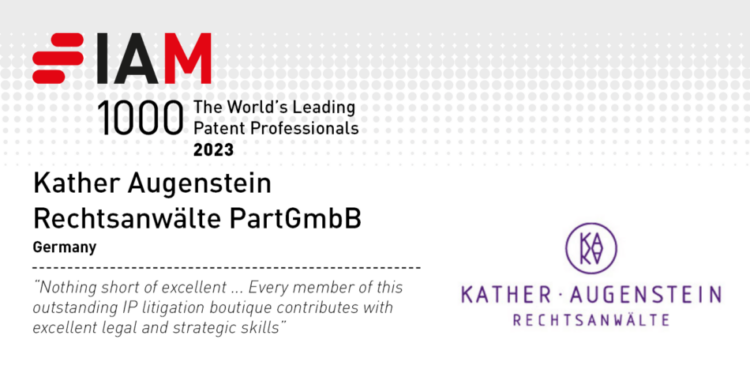
A special thank goes to our team for their outstanding work and to our clients for their continued trust in us.
“Following this year’s nominations by IP Stars, top rankings by The Legal500 and Best Lawyers by Handelsblatt, this is a further recognition in 2023 that we and the whole team are delighted to receive,” added Miriam Kiefer, Managing Partner, Kather Augenstein.
The full online edition of 2023 can be found here.
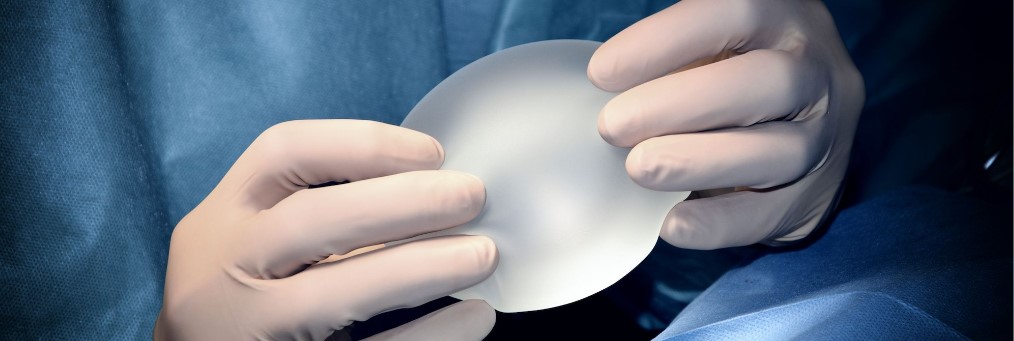
Latest News.
Patent vindication and document submission
In its judgement of 26.07.2022 – X ZR 17/21 – Brustimplantat (Breast Implant), the Federal Court of Justice (FCJ/ BGH) dealt with the patent law vindication and thereby consolidated its established case law:
Whether a person entitled to a patent may demand the assignment of a patent or the grant of a joint right thereto under Sec 8 (1), (2) German Patent Act requires a comparing examination of the patent´s teaching with the teaching of the alleged unlawful taking. For this purpose, it is primarily necessary to examine to what extent both teachings correspond (confirmation of BGH GRUR 2016, 265, para. 22 – Kfz Stahlbauteil; BGH GRUR 2020, 1186, para. 41 – Mitralklappenprothese). Furthermore, the judgment provides a nice overview of the possibilities to oblige a party not burdened with evidence to submit documents to the court.
Facts:
In this case, two companies had worked together for more than a decade on the development of breast implants. In the course of this, there had been frequent factory and company visits, the extent of which was disputed between the parties. After the end of the cooperation, the defendant applied for the patent in dispute.
The patent in suit discloses a method for manufacturing implants or intermediate products of such implants. The aim is to avoid a circumferential seam on the implant shell, as this can lead to bodily incompatibilities. For this purpose, the seam is formed on the back of the implant shell by placing a first foam layer on the silicone up to the back. The foam layer is bonded to the implant shell by vulcanisation. The second foam layer then only has to cover a small area on the back of the implant shell, which significantly reduces the circumference of the seam.
In the proceedings, the plaintiff had submitted various documents from which it should be apparent that it had already been in possession of the teaching in accordance with the patent. The plaintiff requested, inter alia, that the defendant be ordered to transfer all national parts of the patent to the plaintiff and to consent to the rewriting of the national parts to the respective national patent offices, or alternatively to grant a joint entitlement.
The defendant explained that the patent was the result of its own research. This resulted in particular from a document (TD 2007) which was prepared by the defendant at the end of the cooperation. The plaintiff objected that the content of this document was almost identical to an older document (TD 2003) which originated from the time of the parties’ cooperation. Differences only arose with regard to a different production site. However, the TD 2003 was exclusively in the possession of the defendant.
The RC Frankfurt a. M. and the HRC Frankfurt a. M. had dismissed the action because the plaintiff had not sufficiently proven either ownership of the invention or the act of extraction.
Presentation of the vindication requirements:
The FCJ overturned the decision and referred it back to the HRC Frankfurt a. M. for a new hearing. In the opinion of the FCJ, the plaintiff had sufficiently demonstrated ownership of the invention by submitting documents. The FCJ considered the teaching of the patent to cover not only vulcanisation as a form of application, but it was also clear from the description that the foam layer was pulled, pressed or stretched before vulcanisation. Against this background, the plaintiff had already sufficiently argued its ownership of the invention. For a factual submission in support of a claim is conclusive and relevant if the party submits facts which, in combination with a legal proposition, are suitable and necessary to make the asserted right appear to have arisen in the person of the party. The submission must be concrete enough to be able to assess the materiality of the facts and to enable the opponent to comment. If these requirements are met and the submission is substantially contested by the opposing party, it is up to the court to take evidence (by way of example: BGH NJW-RR 2022, 634, marginal no. 10).
In this respect, the plaintiff’s documents showed that it had already manufactured breast implants at an earlier stage of the cooperation using a process that had the features of the patent in suit.
Insofar as the defendant relied on the document TD 2007, the FCJ considered it possible that a comparison with the TD 2003 could show that the TD 2003 already described the invention in full.
Document Submission Obligations:
In the following, the FCJ therefore dealt with the question of whether the defendant had a duty to submit documents. The FCJ rejected such an obligation under Sec 423 of the German Civil Procedure Code (ZPO) in line with the HRC Frankfurt a. M., since the defendant referred to the document at most to explain its arguments and not “to provide evidence” as required by the wording.
However, the FCJ criticised the premature rejection of a duty under Sec 422 ZPO in conjunction with Sec 810 ZPO, as the TD 2003 had still been prepared during the intensive cooperation and had therefore at least also been prepared in the interest of the plaintiff. In its renewed decision, the HRC Frankfurt a. M. would also have to weigh any interests in secrecy against the probability that the TD 2003 already described the invention in full.
If no obligation arose from Sec 422 ZPO, the Court of Appeal would have to decide again on the submission order pursuant to Sec 142 (1) ZPO. In any case, a refusal could not be based solely on the defendant’s interests in secrecy, as these could also be taken into account by blacking out the non-relevant passages. The FCJ also makes a general reference to the possibility of a protective order under the new Sec 145a German Patent Act in conjunction with Sec 16 and 19 Business Secret Act.
CReative Contribution:
In the subsequent assessment of a creative contribution by the plaintiff, it was not necessary for it to have an independent inventive content (BGH GRUR 2001, 903, paras. 14, 21- Atemdrucksteuerung). Furthermore, it was wrong to examine each feature as to whether it was known in the prior art itself (BGH GRUR 2001, 903, marginal no., 21- Atemdrucksteuerung). Only those contributions that have not influenced the overall success, i.e. are insignificant in relation to the solution, and those that were created on the instructions of an inventor or third party, are to be excluded (BGH GRUR 2020, 1186, marginal no. 39 – Mitralklappenprothese).
conclusion:
In summary, the judgement does not represent a legal novelty. It emphasises once again that also and especially in the case of a vindication, the teaching of the patent applied for must be examined. In vindication cases, the plaintiff is usually at the back of the pack. Their submission must be specific enough to be able to assess the relevance of the facts and to enable the opponent to comment, but no more. For this purpose, it is advisable to make use of documents when presenting the case and to work less with witnesses who, for example, are supposed to prove company visits and their extent.
Furthermore, the judgement shows various procedural possibilities how the party not burdened with evidence can be obliged to submit documents. In this respect, the FCJ has already clarified in NJW 2007, 2989 – Einwertungsunterlagen für “Schrottimmobilien” that it is a discretionary error if the court does not consider an order at all if the requirements of Sec 142 ZPO are met. Thus, practitioners in particular should keep the relevant provisions in mind.
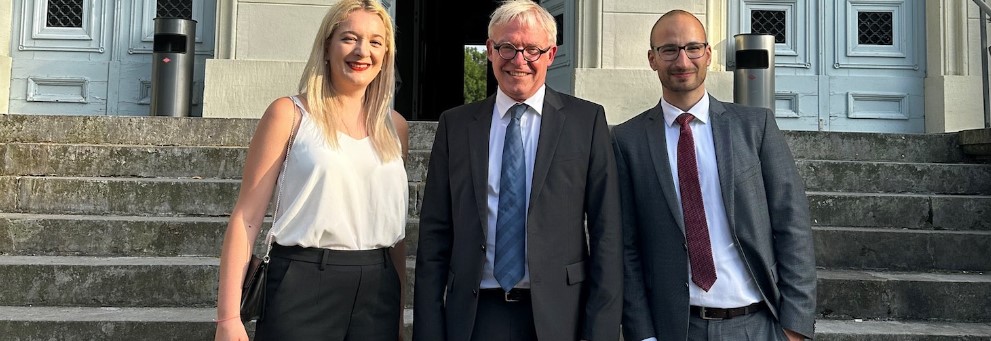
Latest News.
In-depth specialisation in IP law – Sophie Prudent and Dr Benedikt Walesch aquire Master of Laws (LL.M.) qualifications
Our colleagues, Sophie Prudent and Dr Benedikt Walesch, have successfully completed the part-time Master’s programme in Intellectual Property Law at the Heinrich Heine University in Düsseldorf. They celebrated their diplomas with excellent grades last Friday, 24 June 2023, at Mickeln Castle.
The programme is particularly practice-oriented. “It was very enriching that we were able to pick up helpful tips from experienced practitioners in the lectures and deepen our knowledge in intellectual property law. We made a conscious decision to do the extra-occupational course at Heinrich Heine University in order to remain accessible to our clients and to be able to put what we have learned directly into practice. With this extensive further training, this naturally requires very good time management,” report Sophie Prudent and Benedikt Walesch in unison. “We can highly recommend this programme to anyone who wants to deepen their specialist knowledge in IP.
With her master’s thesis, Sophie Prudent focused on national injunction proceedings in patent law. “German case law has always been a controversial subject. The ECJ decision Phoenix Contact/Harting also met with controversy. I found it exciting to deal with the different justification approaches and the possible effects of the ECJ judgment on case law,” says Sophie Prudent. Her work was given the top mark of “outstanding”.
In his Master’s thesis, Dr Benedikt Walesch delved deeper into the UPC court system and dealt with the “interim measures before the UPC” and compared them with the national procedural rules. “I find it exciting to be at the forefront of the emergence of a new court system. That’s why I wanted to delve deeper into the regulations of the new system in my Master’s thesis and compare the new regulatory approaches with national law.” He also received the highest grade of “outstanding” for his Master’s thesis.
We are very delighted that our colleague Dr. Benedikt Walesch was able to complete the Master’s programme as best student of the year with the highest grade of “outstanding”. For this excellent achievement he was awarded the prize for the best degree.
We congratulate our colleagues Sophie Prudent and Dr Benedikt Walesch sincerely. You are now holding the internationally recognised and renowned “Master of Laws” (LL.M.) degree.

Latest News.
Special honour – Kather Augenstein receives Imapct Case of the Year Award at prestigious Managing IP EMEA Awards 2023
Kather Augenstein has received a special recognition with the “Impact Case of the Year – Heitec v Heitech Promotion” at the 18th annual Managing IP EMEA Awards, held in London yesterday, 21 June 2023. Our IP Boutique was among the prestigious European IP and law firms honoured at last night’s festive award ceremony.
Each year, the Manging IP EMEA Awards honour the in-house teams, law firms, lawyers and companies that have been significantly responsible for the most innovative and challenging IP work in the past year, driving the international market forward.
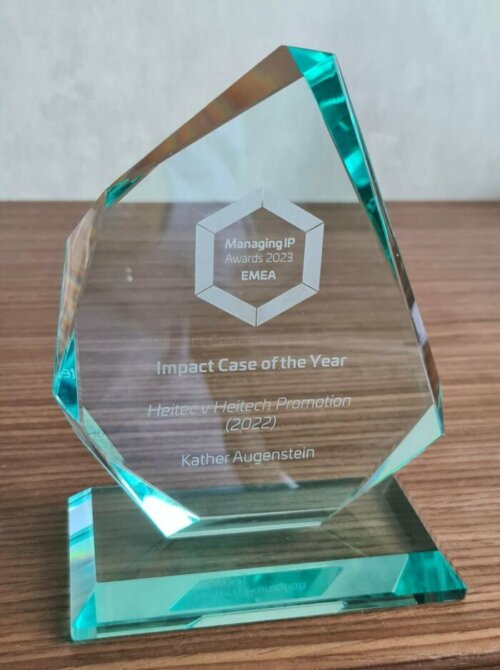
Commenting on winning the award, Dr Christof Augenstein said: “We are delighted to have been honoured as one of the winners of the European Impact Cases of the Year at the Managing IP Awards 2023 in the trademark case Heitec v Heitech Promotion. I was personally involved in this lawsuit from the beginning, which we successfully brought to a close earlier this year after several instances before the Federal Court of Justice and the European Court of Justice after almost nine years. It is a great honour that our work has been recognised with this award.”
Detailed background information on the case can be found in the news and blog section.
A full list of award winners can be found here.

Latest News.
Leaders League Rankings 2023: Kather Augenstein recognised as on of the leading law firms for patent and trademark litigation
We are pleased to have once again been recognised as one of the leading intellectual property law firms for patent and trademark litigation in this year’s 2023 Leaders League Rankings.
In the process, the Kather Augenstein team was rated “excellent” in the new Leaders League rank ings in the category of patent litigation and was also rated “highly recommended” in the area of trademark litigation.
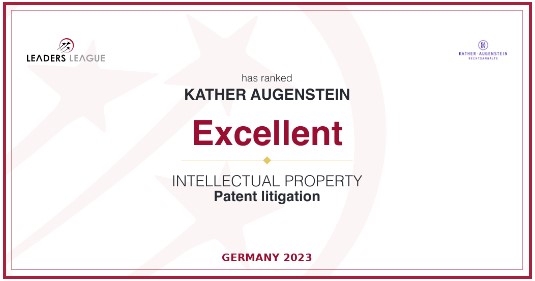

We congratulate our partners Dr. Peter Kather, Dr. Christof Augenstein, Miriam Kiefer LL.M., Christopher Weber und Sören Dahm an the entire team for this special recognition.
Leaders League is a media and ratings agency for top international executives, regularly providing international rankings and news content for the legal, financial, technology and human resources industries. The company specialises in law firm rankings and market research that are used by a wide range of companies and executives in their decision-making.
All rankings are available on Leaders League.
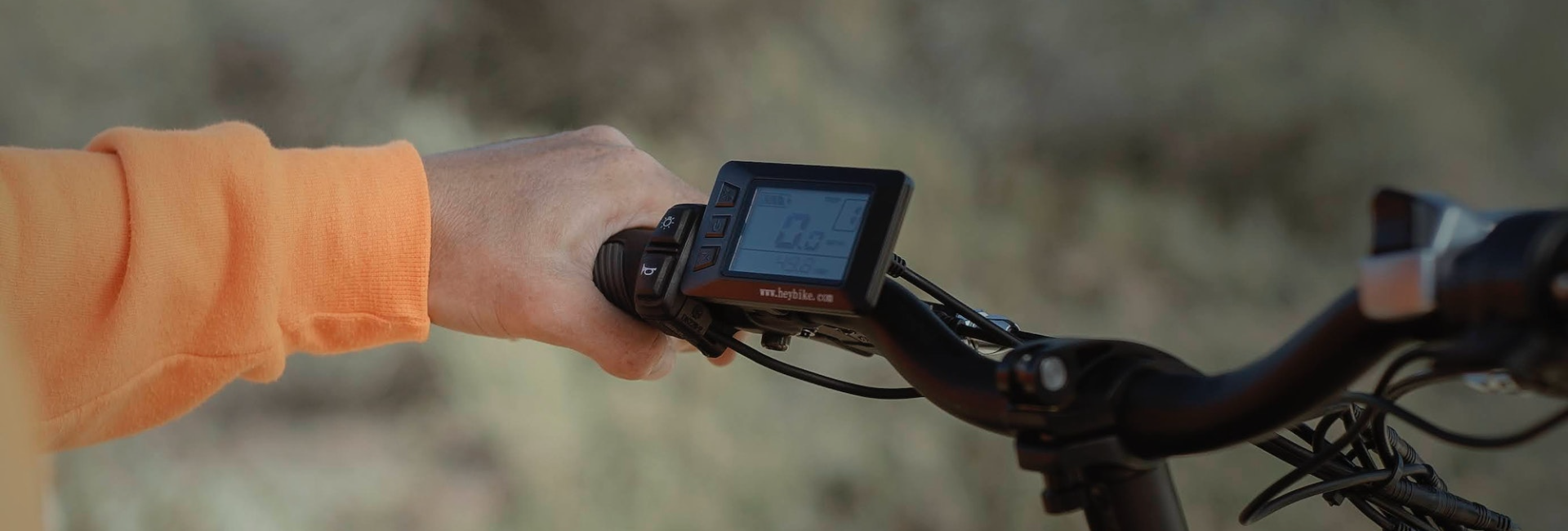
Latest News.
#wirfahrenmit: climate-friendly and health-promoting on the road with the service bike
We are very proud that a large number of our employees benefit from our digital service bike programme with @DeutscheDienstrad. This adds another important component to our multifaceted portfolio of employee benefits, while at the same time important building block and at the same time promote the health of our team.
With the Deutsche Dienstrad offer, we provide our employees affordable and climate-neutral access to sustainable mobility. Due to the free choice of brands, models and manufacturers, all wishes remain unfulfilled and each employee has the opportunity to individually design his or her dream bike.
With the MobilityHub of Deutsche Dienstrad, every participant decides where and how they choose and receive their service bike.
Together, we are making an active contribution to climate protection and having a positive effect on CO2 emissions of our world, both professionally and privately.
We make Germany move with our #team at @KatherAugenstein.


Latest News.
On today’s launch of the Unified Patent Court (UPC): Christof Augenstein in podcast interview with Emily O’Neill of Deminor Litigation Funding.
In an ongoing podcast series, Emily O’Neill, General Counsel UK and Global Intellectual Property Lead at Deminor Litigation Funding, interviews global experts to understand the implications of the new Unified Patent Court (UPC).
In his latest interview, our Dr. Partner Christof Augenstein provides valuable insights into the upcoming Unified Patent Court (UPC), discusses its overall significance, and outlines his predictions for the early days of the new system and beyond.
You can find the full interview with podcast sequences here
Deminor is the brand name of the Deminor Recovery Services Group, which assists companies and investors with legal claims.
Deminor is a pioneer in its field and has played a leading role in numerous pivotal investor lawsuits around the world. The group operates in 15 jurisdictions and has seven offices in Europe, the UK, the US and Asia.

Latest News.
News in the case of the paprika patent
Staple foods such as fruits and vegetables have been grown and consumed for thousands of years. Meanwhile, however, there are legal, especially patent, requirements to be observed in this regard as well. With its latest decision in the case of the pepper patent, the European Patent Office is now reigniting the debate on ethical and legal aspects of patent law in agriculture. But what is the paprika patent all about and why is it so controversial?
In 2013, the European Patent Office (EPO) approved a patent on an insect-resistant pepper plant (EP2140023) for the Syngenta corporation. The insect resistance of the pepper plant resulted from crossing a wild pepper plant from Jamaica with a commercial pepper plant and subsequent selection of the common offspring. The company learned about the resistance through a freely accessible database. The granted patent covers the pepper plants themselves, their use, their fruits, their seeds and all breeding steps. Syngenta thus claimed both the cultivation and harvesting of the plants.
In the following year, an alliance of various NGOs, breeders, seed initiatives and farmers’ organisations filed an objection against this patent grant. They criticised that the crossing of the pepper plant had been done in the conventional way and with the help of a freely accessible database, and that the insect resistance was thus a naturally occurring genetic trait and not an invention of its own. Patenting naturally occurring gene traits would monopolise biodiversity and endanger access to it.
In February 2023, the patent was again confirmed by the EPO, even though such a patent is actually no longer permissible according to current case law. Since 2017, no patents may be granted for plant varieties that have been created by natural methods such as crossing and selection. Accordingly, only plant varieties that have been genetically engineered are still eligible for patent. Genetic engineering is patented, but genetic diversity and seeds are not. However, Syngenta applied for the pepper patent in 2008, well before the new legislation.
Nevertheless, the current case law continues to create uncertainty, because genetically engineered plants can in many cases also be created by classical crossing with subsequent selection. Whether the genetically engineered plants may nevertheless be patented in these cases is currently a matter of dispute. Whether and to what extent patent law in agriculture will continue to develop will be shown by future patent law decisions.
